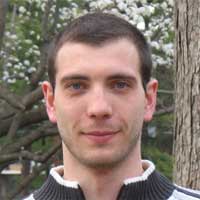Workshop on
Quantum Mechanics: Axiomatics of Measurements and connections with Computing and Information Retrieval
Some rationality constraints on a Bayesian noncommutative conditionalization rule
>PRESENTATION:
Giovanni Valente is a PhD student in the Committee for Philosophy and
the Sciences at University of Maryland, where he works on foundations
of Quantum Mechanics under Jeff Bub. He received his degree in philosophy
at University of Padua in 2003 with a thesis on the Bayesian interpretation
of quantum probability. He also spent periods of study at the Sub-faculty
of Philosophy in Oxford (Spring 2003) and at the Eotvos Lorand University
in Budapest (Spring 2004). He mainly deals with philosophy of quantum
mechanics, algebraic approach to physical theories, quantum information
and philosophy of probability.

In this talk I shall start by reviewing a noncommutative conditionalization rule which generalizes the classical Bayes rule in algebraic terms. Accordingly, the existence of a well-behaving conditional expectation proves a necessary condition for a Bayesian interpretation of probabilities in Quantum Mechanics. In particular, one needs to account for the case in which the agent-observer allegedly revises her degrees of belief, namely the quantum states, in light of knowing that a quantum measurement has been performed. A stability condition formulated by the philosopher Miklos Redei gives rise to a rationality constraint on conditional probabilities which characterises Bayesianism. That places a strong requirement on the conditional expectation map, which fails to hold in Quantum Mechanics, thus challenging the tenability of a Bayesian interpretation of quantum probabilities. I shall raise and critically survey three possible solutions to Redei's argument; by doing this, I shall introduce additional rationality constraints, further showing what it takes for quantum states to be degrees of belief of a rational agent.